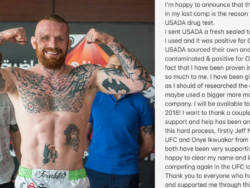The trouble with Ostarine: Jimmy Wallhead’s
16th March 2018
Features


The Court of Arbitration for Sport (CAS) has upheld an appeal by Drug Free Sport New Zealand (DFSNZ), accepting that Karl Murray should be sanctioned with a two year ban for coaching athletes whilst banned and misleading investigators. The decision means that Murray must restart a two year ban – originally issued by the New Caledonia Anti-Doping Commission on 23 April 2014 – from 15 December 2017, the date of the CAS award (PDF below).
DFSNZ appealed against a 20 December 2016 decision (PDF below) to clear Murray of coaching athletes whilst banned. The Sports Tribunal of New Zealand (STNZ) ruled that DFSNZ had not proven that Murray was coaching Ruby Livingstone and a youth cyclist, referred to as Janet Smith in its decision, and as ‘Miss A’ in the CAS decision.
Due to evidence submitted by DFSNZ, the CAS had no such concerns. It accepted that DFSNZ had proven that Murray had coached both athletes whilst banned, and that bank payments between the parents of one of the athletes and Murray proved that he had been paid for providing such training.
The CAS found that Murray was coaching Livingstone through a third party, Rachael Larner. It found that Livingstone would also message Murray, who would tell her to ‘delete the messages from him after any conversation if anything in them looked suspicious’. It found that Livingstone was ‘prepped by Mr Murray as to what she should say and was told to deny he was coaching her. He made her listen to his recording of his interview with DFSNZ and his lawyer and asked her to act like his lawyer had said, namely to be quite blunt and quite defensive.’
The CAS also found that Murray had lied to DFSNZ investigators, by denying providing training programmes to the cyclists concerned. However, it held that the impact of Murray’s lie ‘was so negligible as to arguably amount to having had no effect on the investigation at all, much less result in “subverting” the process’. Therefore, an allegation that he breached Article 2.5 of New Zealand’s Sports Anti-Doping Rules (SADR), which refers to tampering – or attempted tampering – with a doping control, was dismissed.
In contrast to the STNZ decision, the CAS found that ‘there was no evidence that DFSNZ bullied, threatened or intimidated Miss A [Janet Smith in the STNZ decision]’. The STNZ Panel was critical of the ‘heavy handed manner’ in which DFSNZ interviewed witnesses. One of the witnesses, Ruby Livingstone, was reduced to tears, was told that she could be prosecuted if Murray was prosecuted and felt she “was just about prepared to say anything they wanted to get them off her back”.
Murray will therefore receive a two year sanction as from 15 December, the date of the CAS decision. However, he will receive credit for his voluntary provisional suspension from 23 March 2016 to 20 December 2016, which means that his ban should expire on 18 March 2019.
The CAS decision was welcomed by DFSNZ, which is now free to pursue an additional sanction against Murray, who returned an adverse analytical finding (AAF) for clenbuterol at the Tour of Northland on 18 March this year, after his return from his initial ban. Murray alleges that the DFSNZ team that conducted his test did not follow proper procedure, but does not contest the result of the test. A decision on a further sanction is expected earlier next year.
• Eleven athletes (and a horse trainer) from eleven countries, competing in nine sports, were...
• 20 athletes from nine countries, competing in ten sports, were involved in anti-doping proceedings...
• Twenty four athletes from 13 countries, competing in eight sports, were involved in anti-doping...